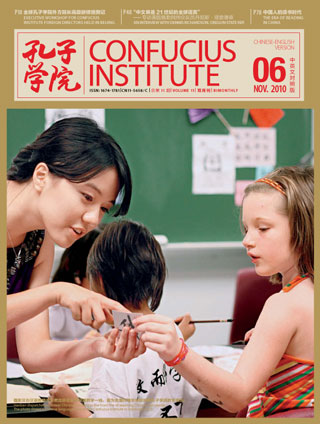
Dennis Richardson: “Chinese will be the global language of the XXI Century”
An Interview with Dennis Richardson, Oregon State Representative. An enthusiastic advocate of promoting Chinese study and also dedicated to the work of developing the relationship between his state and China.
REPORTER‘S NOTES
In early February 2010, by unanimous vote of both the Senate and the House of the state of Oregon, two bills were passed requesting the Oregon Superintendent of Public Instruction to encourage Chinese language study by promoting establishment of Confucius Classrooms in Oregon public schools, thus making Oregon the rst US state to pass such bills.
Dennis Richardson, the Republican Representative from Central Point, Oregon, is one of the key lawmakers who sponsored these two bills. After the bills got passed, Mr. Richardson focused on the subsequent harmonization and lobbying work for these two bills which are huge and complex. Additionally, he had to get prepared for election campaign in November and eventually he won the re-election to Oregon State House. When he heard what great eort it took us to get in touch with him for an interview, he accepted our interview without hesitation despite his busy schedule.
Mr. Richardson, 61 years old, with his wife Cathy made a conscious decision to pattern their lives after Benjamin Franklin, who believed that a person’s first 50 years of life should be spent learning, earning and raising a family, and their last 50 years should be dedicated to giving back to society in the form of public service.
One of the public services to which he is devoted is promoting opportunities for the next generation in Oregon to learn the Chinese language. He not only encourages his own grandchildren to learn Chinese, but he and his wife go to the local Confucius Classroom to learn Chinese too.
Besides being an enthusiastic advocate of promoting Chinese study in Oregon, Mr. Richardson is also dedicated to the work of developing the relationship between his state and China. Since 2003, he has led six trading delegations to China. In last September, he was named “Honorary Citizen of Fujian Province” due to his years of contribution to promoting relationships between Oregon and China.
So what has caused him to so enthusiastically advocate Chinese language study in public schools in his home state? What, in his opinion, are the longterm gains of learning foreign languages, Chinese in particular, for future American generations? Will English dominate as a universal language forever?
Representative Richardson will answer all these questions. In our exclusive interview, he tells his stories which show his love for the future generations in his state and voices some views which show his great vision and insight.
REPORTER: Early this year, 2 bills sponsored by you and other Oregon’s legislators to promote opportunities for learning Chinese language in public schools in Oregon got passed by unanimous consent, making Oregon the first U.S. state to pass the similar bills. In your view, what has it meant to Oregon?
RICHARDSON: In February Senate Joint Resolution 50 and House Bill 3628 were passed by unanimous votes in both the Senate and the House. These bills remind us that there are more people who speak Chinese than any other language in the world.
In addition, Oregon now exports $3 Billion worth of Oregon products to China every year—making China, Oregon’s number 1 trading partner. American businesses can buy goods made in China without speaking Chinese, but American businesses cannot sell American products to Chinese consumers without having representatives who speak Chinese and understand Chinese culture.
In sum, when looking to the future, opportunities will be vast for students who are fluent in Chinese. Oregon’s legislators are asking the Department of Education to help facilitate the utilization of China’s many trained teachers who are ready, willing and able to come to our communities and share their knowledge and love for the Chinese language and culture. Through the Confucius Classroom program many Oregon schools and communities will learn more about the world in which we live and the realities of our 21st century global community.

REPORTER: Why do you prefer to promote the idea for Oregon students?
RICHARDSON: I have been to China many times, and I am a strong supporter of enabling the rising generation of Oregon students to learn Mandarin Chinese as their second language. If we give Oregon students such learning opportunities as children, as adults they will be prepared to grasp life changing job opportunities when they appear.
China will be a dominant force for economic development, for national security, and for peace. If the enormity of China’s impact on Oregon, on America and on the world is destined to be a hallmark of the 21st century, Oregon students should be given every opportunity and encouragement to learn the Chinese language and experience China’s culture, society and economic communities.

REPORTER: In your view, what are the long-term gains of learning foreign languages for the future of the younger generation? Can you offer some vivid examples?
RICHARDSON: Let me tell you my personal story. My wife, Cathy, and I support learning foreign languages and learning about foreign cultures. We have one son and eight daughters. ey are all grown now, but when they were young, we lovingly encouraged them to pay us back for providing a good home by doing their chores, learning to speak Spanish and to play the piano.
To help promote learning Spanish we accepted the opportunity for a Mexican girl, Ana Monasterio, to live with us for a semester. Ana was 12 years old and our twins, Jennifer and Valerie, were 11. The three of them were like close sisters. When the school year ended, Ana returned to her home in Mexico. She missed our twins so much that her family invited Jen and Val to come live in their Mexico City home, attend school and learn Spanish. It was difficult for us to let our 12- year-old children leave the nest, but Cathy and I felt the Monasterio’s home would be a safe place. Eventually we agreed for the twins to fly to Mexico. After four months Jen and Val returned home with exciting stories of their experiences while living in Mexico. For our family there was no turning back new horizons had been opened for the rest of our girls and most of them were determined to have their own foreign adventures.
Six of our daughters were able to spend 3-4 months living in Mexico with Mexican families and attending Mexican schools. In addition to the six who lived in Mexico, our youngest daughter lived with an older sister’s family in Egypt for a semester—that too was an unforgettable experience for all of them.
Although being alone in a foreign land as a young teenager sounded exciting to our girls, all of them soon learned how difficult it was to be suddenly thrust into a foreign culture with people who spoke a language they could not understand. Like Ana in our home, it was total immersion and, although challenging, it was a great educational experience. e experience would have been better if the girls had learned to speak Spanish before living and studying in Mexico.
Learning a foreign language and experiencing a foreign culture can be life changing. Our daughters who did so learned a great deal about themselves, about life, and about how fortunate they were to live in America. In differing degrees, most of them also learned to speak Spanish and to love the Mexican people and culture.
There’s a reason why I have shared with you the story of my daughters living in foreign lands. As a result of their experiences in other countries and cultures, my children are more compassionate to those who are less fortunate, and have a greater appreciation for the blessings of living in America. As I consider what is happening in our world, and what the rest of the 21st century will be like, I believe the world’s future and Oregon’s future will be brighter if as many students as possible learn a foreign language and experience foreign culture. A generation ago, in our family it was Spanish. Today it would be Chinese. Spanish may be a good language to know, but Chinese will be the global language of the 21st century.

REPORTER: Someone would argue that English will be the only universal language in global communication forever. Given the reality that Chinese kids have been working very hard to learn English, hoping to talk to Americans with fluent English when they grow up, do you think it really matters if Americans learn Chinese language when they are at school?
RICHARDSON: There will always be naysayers. ere are those who say learning Chinese is not important, that English will always be the language of international business and the dollar the currency of international business. To them I recommend there is wisdom in preparing for possible changes in the future. Besides, learning a foreign language is good training for students; Learning at least one foreign language is an established practice and basic to education in most countries around the world. e benefits in the job market are obvious. Additionally, it just makes good sense. People respect and want to do business with those who can converse with them in their own language. This is certainly true with the Chinese.
In addition to the benefits to Oregon for our students to become fluent in Chinese language and culture, there are global ramifications if America fails to understand China.
What cost might our society pay if we do not gain a broad and deep understanding of China that could help build world political stability throughout the 21st century?
America was the global power of the 20th century and currently has the largest economy in the world, but there are no guarantees for what will happen in the future. One thing is certain, China is a powerhouse economy and Oregon has the potential to become America’s gateway to the East. is can happen if we have the vision, the language and cultural competency, and the determination to grasp this opportunity without delay.
If we fail to take action now, I am convinced Oregon will be missing a great opportunity. This concern also applies to America. Our action or inaction relating to China could affect the future of world peace and stability.
Oregon cannot do everything, but we can do something. We can enable our students and our citizens to learn about the Chinese culture, its history and its language. Much is at stake and we should learn from history the consequences of failing to understand the culture and language of a powerful, distant nation.
REPORTER: What can Oregon and China learn from each other?
RICHARDSON: Oregon has much to learn from the Chinese. The Chinese culture has matured over 5,000 years and is based on respect, honor and strong personal and family relationships. And, with Oregon’s experience with high tech, the environment, sustainable energy and, historically, an economy based on entrepreneurial spirit and free enterprise, Oregon has much to share with China.
REPORTER: For most Chinese people, Oregon is not as familiar as those states like CA and NY. Encouragingly, we can see more intimate ties between China and Oregon…
RICHARDSON: Oregon’s connection with China has grown dramatically since Governor Atiyeh signed sister-state accords with Fujian Province in 1984. China is now Oregon’s number one trade partner. I have traveled to China seven times in the past eight years—six delegations for Oregon and one with the National Conference of State Legislatures. Every time I travel to China I see a vibrant, growing economic powerhouse. I renew old friendships and make new ones. ese relationships are important to me and to the citizens of Oregon. Just the economic consequences of the Oregon-China relationships alone are substantial.
I wish I could take credit for the Oregon-China economic growth, but I cannot. I can only say that in some small way our legislative delegations are contributing to better Oregon-China relationships, are promoting educational exchange, and are generating commerce with individual Oregon companies and universities, and are thereby creating new Oregon jobs.
It is a small thing to promote and participate in Oregon-China delegations, but I can see the benefits, and it is something that I can do to benefit our state, our economy, our students and our future. As I see it, meaningful relationships are between people, not governments, and positive interactions between the people of China and the U.S. will, hopefully, contribute to a prosperous and peaceful future for both.
 Published in Confucius Institute Magazine
Published in Confucius Institute MagazineNumber 11. Volume VI. November 2010.
View/Download the print issue in PDF

























No hay comentarios:
Publicar un comentario